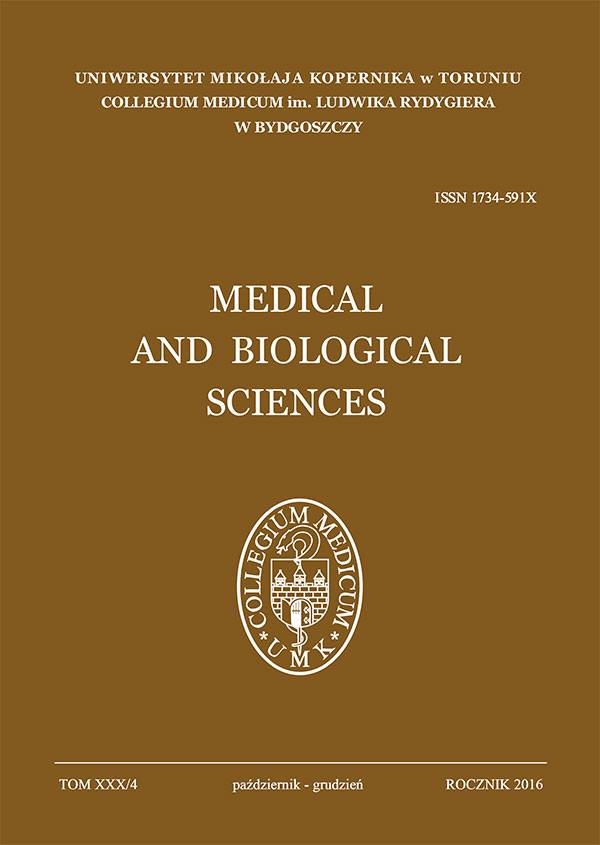Assessment of the cognitive functions in kayakers of the national team after a training cycle combined with whole body cryotherapy
DOI:
https://doi.org/10.12775/MBS.2016.028Keywords
whole body cryotherapy, cognitive processes, sport psychologyAbstract
Introduction. Using the Quick Mind Testing method, the efficiency of cognitive functions in kayakers after physical training combined with whole body cryotherapy was assessed.
Material and methods. The athletes (n = 17) performed the Quick Mind Testing on the first day and at the end of a 2-month training cycle, as well as before and after whole body cryotherapy conducted between the 5th and the 15th day of the cycle. Cryotherapy was administered twice a day, before and after training (20 sessions altogether). One cryotherapy session lasted 3 mins with the temperature gradually decreased from the initial -120oC to the final -145oC.
Results. After the training period, the kayakers committed approx. 2 times less incorrect Go and NoGo reactions, and approx. 12% more correct NoGo (p < .004) reactions, as well as gave more correct answers in the ATTENTION test (p < .004) than on the first day of training. After cryotherapy, as compared with the results obtained before the cryochamber stimulation, the kayakers gave more correct answers in the ATTENTION test.
Conclusions. Physical training combined with whole body cryotherapy increases the mental efficiency of kayakers, which may affect the efficiency of physical exercise.References
Jarvis M. (2000). Sport Psychology. London and New York: Routledge.
Andersen M.B. (2005). Sport Psychology in Practice. Human Kinetics Publishers.
Ebbeling C.B., Clarkson P.M. (1989). Exercise- induced muscle damage and adaptation. Sports Medicine 7(4), 207-223. DOI: 10.2165/00007256-198907040-00001.
Pyne D.B. (1994). Exercise – induced muscle damage and inflammation. Australian Journal of Science and Medicine in Sport 26, 49-58.
Drewa G., Woźniak A., Chęsy G., Rakowski A., Woźniak B., Woźniak J. (1999). Effect of exercise on the concentration of the thiobarbituric acid reactive substances (TBARS) in the blood plasma and erythrocytes of weightlifters. Biology of Sport 16, 105-112.
Drewa G., Maciak R., Woźniak A., Chęsy G., Rakowski A., Woźniak B. et al. (2000). Influence of exercise on arylsulphatase and acid phosphatase activities in blood serum of kayakers and rowers. Biology of Sport 17, 289-297.
Woźniak A., Drewa G., Chęsy G., Rakowski A., Rozwodowska M., Olszewska D. (2001). Effect of altitude training on the peroxidation and antioxidant enzymes in sportsmen. Medicine & Science in Sport & Exercise 33, 1109-1113. Retreived from: http://journals.lww.com/acsm-msse/Abstract/2001/07000/Effect_of_altitude_training_on_ the_peroxidation.7.aspx
Woźniak A., Woźniak G., Drewa G., Mila-Kierzenkowska, C., Rakowski A. (2007). The effect of whole-body cryostimulation on lysosomal enzyme activity in kayakers during training. European Journal of Applied Physiology 100, 137-142. DOI: 10.1007/s00421-007-0404-0.
Wyżnikiewicz-Nawracała A. (2003). On the threshold of training and overtraining. In J. Kłodecka- Różalska (Ed.) Female athlete a woman of success…Advantages and barriers of women’s sport activities (pp. 168-175). Warsaw: Polskie Stowarzyszenie Sportu Kobiet i Instytut Sportu w Warszawie. [in Polish]
Łubkowska W., Troszczyński J., Sieńko-Awierianów E. (2014). Assignment of usefulness of physiotherapy applied to sports training in the case of Szczecin swimmers. Central European Journal of Sport Sciences and Medicine 7(3): 37-43.
Hubbard T. J., Aronson S. L., Denegar C. R. (2004). Does Cryotherapy Hasten Return to Participation? A Systematic Review. Journal of Athletic Training 39(1), 88-94. Retrieved from: http://www.ncbi.nlm.nih.gov/pmc/articles/PMC385267/
Swenson C., Sward L., Karlsson, J. (1996). Cryotherapy in sports medicine. Scandinavian Journal of Medicine & Science in Sports 6, 193-200. DOI: 10.1111/j.1600-0838.1996.tb00090.x
Jonak A., Skrzek, A. (2009). Cryotherapy in athletes’ biological regeneration – review. Acta Bio-Optica et Informatica Medica 15, 319-321. Retrieved from: http://www.inzynieria-biomedyczna.com/
Banfi G., Lombardi G., Colombini A., Melegati G. (2010). Whole-body cryotherapy in Athletes. Sports Medicine 40, 509-17. DOI: 10.2165/11531940-000000000-00000.
Chwalbińska-Moneta J. (2003). Cryostimulation impact on some stress reactions of athletes. Sport Wyczynowy 5-6, 50-54. [in Polish]
Hausswirth Ch., Louis J., Bieuzen F., Pournot H., Fournier J., Filliard J. et al. (2011). Effects of Whole-Body Cryotherapy vs. Far-Infrared vs. Passive Modalities on Recovery from Exercise-Induced Muscle Damage in Highly-Trained Runners. PLoS One 6(12), e27749. DOI: 10.1371/journal.pone.0027749
Miller E., Markiewicz Ł., Saluk J., Majsterek I. (2012). Effect of short-term cryostimulation on antioxidative status and its clinical applications in humans. European Journal of Applied Physiology 112(5): 1645-1652. DOI: 10.1007/s00421-011-2122-x.
Algafly A., George K.P. (2007). The effect of cryotherapy on nerve conduction velocity, pain threshold and pain tolerance. British Journal of Sports Medicine 41, 365-369. DOI:10.1136/bjsm.2006.031237
Douglas M., Bivens S., Pesterfield J., Clemson N., Castle W., Sole G., et al. (2013). Immediate effects of cryotherapy on static and dynamic balance. International Journal of Sports Physical Therapy 8(1), 9-14. Retrieved from: http://www.ncbi.nlm.nih.gov/pmc/articles/PMC3578429/
Lubkowska A., Szyguła Z., Chlubek D., Banfi G. (2011). The effect of prolonged whole-body cryostimulation treatment with different amounts of sessions on chosen pro- and anti-inflammatory cytokines levels in healthy men. Scandinavian Journal of Clinical and Laboratory Investigation 71(5), 419-425.
Rymaszewska J., Biały D., Zagrobelny Z., Kiejna A. (2000). The Influence of whole body cryotherapy on mental health. Psychatria Polska 34(4), 649-653. Retrieved from: psychiatriapolska.pl
Gould D., Pick S. (1995). Sport psychology: The Griffith era, 1920–1940. The Sport Psychologist 9(4), 391-405.
Vestberg T., Gustafson R., Maurex L., Ingvar M., Petrovic P. (2012). Executive Functions Predict the Success of Top-Soccer Players. PLoS One 7, e34731. DOI: 10.1371/journal.pone.0034731
Memmert D. (2011). Creativity, expertise, and attention: Exploring their development an their relationships. Journal of Sport Science 29, 93-102. DOI: 10.1080/02640414.2010.528014
Monsell S., Driver J. (2000). Control of cognitive processes: Attention and performance. London, England: The MIT Press.
Wang C. H., Chang C. C., Liang Y. M., Shih C. M., Chiu W. S., Tseng, P. et al. (2013). Open vs. Closed Skill Sports and the Modulation of InhibitoryControl. PLoS One 8(2), e55773. DOI: 10.1371/journal.pone.0055773
Bauer J., Skrzek A. (1999). Physiological basis of cryotherapy. Polish Journal of Sports Medicine 15, 3-7.
Wiłkość M., Augustyńska B., Araszkiewicz A., Sobieralska-Michalak K., Dudzic-Koc A. Bijakowski P. (2009). Cognitive functions in alcohol dependent patients. A description of a new cognitive battery QMT (Quick Mind Testing). Medical and Biological Sciences 23(4), 51-57. Retrieved from: https://www.cm.umk.pl/en/images/medical/medical_23_4.pdf
Downloads
Published
How to Cite
Issue
Section
Stats
Number of views and downloads: 932
Number of citations: 0



